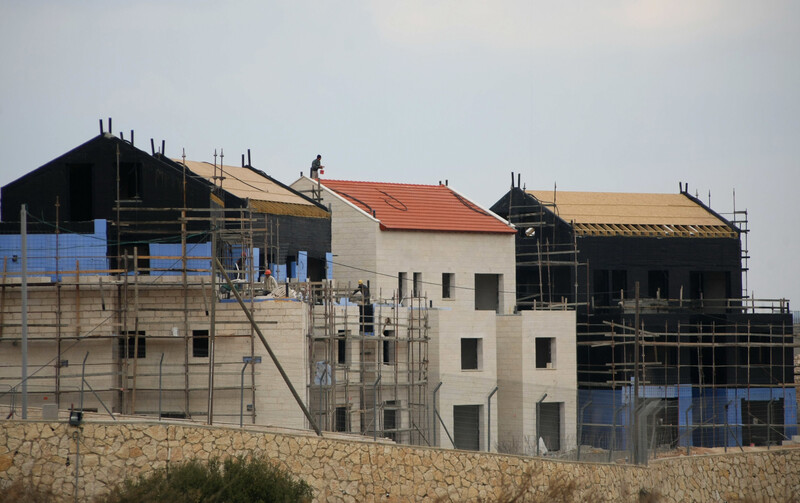Rights and Accountability 12 March 2014

Recent settlement construction near Bethlehem. European banks are withdrawing from investments in Israel’s occupation like never before.
APA imagesNew research suggests that as many as one in seven Dutch institutional investors have excluded companies involved in the Israeli occupation of Palestine in the course of the last five years.
“This is an indication that it is not uncommon,” explains a new report. “Many of these institutional investors did not seek publicity on this decision.” The report emphasizes that many respondents to the survey fear “naming and shaming from NGOs, participants or customers if they go public.”
This suggests that the wave of recent headlines about European divestment from Israeli and Israeli-occupation-linked companies could just be the tip of the iceberg.
Authored by the Dutch Association of Investors for Sustainable Development (VBDO), the report reveals how some investors have excluded companies for their role in the Israeli occupation of Palestine.
Many investors see such exclusions as political. But the UN Guiding Principled for Business and Human Rights — also known as the Ruggie framework — explicitly stipulates that in situations of armed conflict, businesses should respect the standards of international humanitarian law including the Geneva Conventions. Moreover, the Organization for Economic Co-operation and Development (OECD) has incorporated the Ruggie framework in its guidelines for multinational enterprises.
The researchers sent a questionnaire to 50 Dutch pension funds, 30 Dutch insurance companies and 10 Dutch banks. All were given anonymity for the purposes of the report. Twenty-nine institutions responded.
I spoke with VBDO director Giuseppe van der Helm about the new report. He considers non-governmental organizations (NGOs) to be “the conscience of society” who have an important role to play in ethical divestment issues.
Fear of naming and shaming
According to the report, many institutional investors are unfamiliar with the legal and moral aspects of investment, and the associated risks and responsibilities of such investments which may result in involvement in Israel’s violations of international law and human rights.
The anonymous responses to the survey show that a significant percentage of institutional investors have investments in the twelve companies highlighted by VBDO for their role in breaches of international law and violations of human rights in occupied Palestine.
The twelve were: G4S, Caterpillar, Veolia, Heidelberg Cement, Motorola, Hewlett Packard, Dexia, Sodastream, Volvo, Israeli banks, Elbit and Africa Israel.
Their involvement in the occupation varies: e.g. providing security equipment, having branches or production plants in the settlements or extracting natural resources.
Institutional investors often find it difficult to define their position. Stakeholders often perceive taking an investment decision based on non-financial criteria as “taking a political position.”
The respondents also indicate that investments related to occupied Palestine “have become progressively more public.” Only a few institutional investors have a specific policy on this issue. I asked Van der Helm to elaborate on the investors’ fear of naming and shaming.
He says that if investors decide to exclude a company for its role in the occupation of Palestine, “it can become the target of the pro-Israel lobby who want them to continue such investments.” At the same time, “investors risk damage to their reputation by not acting upon their responsibilities following from the OECD guidelines in relation to investments occupied Palestine. They can be targeted in public campaigns.”
Van der Helm thinks that this may explain why companies are reluctant to take a decision for divestment from or exclusion of a company. But “this is tricky, because 70 to 80 percent of the value of a company is non-tangible and includes reputation, goodwill and the brand.”
Take responsibility
Van der Helm underscores the importance that banks, insurance companies or pension funds take responsibility. “Indeed, investments related to occupied Palestine are politicized and sensitive,” he says. “But the OECD guidelines and UN Principles for Responsible Investments are very clear.”
The report includes a chapter on international law and the occupied Palestinian territories which clarifies the responsibilities of companies and investors.
The Ruggie framework, part of the OECD guidelines, states that investments with serious adverse human rights impacts require the investor to “try to use its influence to end the violations or withdraw from financing them if this would turn out not to be possible.” The responsibility is not linked to the volume of the shares in the “corporation that is closer to the human rights violations.”
According to the report, all shareholders have a responsibility.
VBDO advocates that Dutch investors take these responsibilities seriously, says Van der Helm. Moreover, “non-compliance with the OECD guidelines by investors or companies based in any of the signatory countries may lead to a case being brought to an OECD national contact point. This will negatively impact the reputation of a company,” says Van der Helm. He advises investors “to discuss their dilemma’s with stakeholders which will help the decision making.”
Important role for NGO’s
The Boycott, Divestment and Sanctions movement is an international network of NGOs, social movements, trade unions and concerned citizens.
Van der Helm confirms that NGOs have an important role to play in promoting sustainable investment. He considers NGOs as the “carriers of the conscience of society who have a lot of knowledge.” His advice to NGOs calling for divestment from companies involved in the occupation of Palestine is to “provide investors with factual information, express their stand confidently and tell it like it is.”
VBDO will organize a round-table discussion with investors and NGOs as a follow up to the report.





